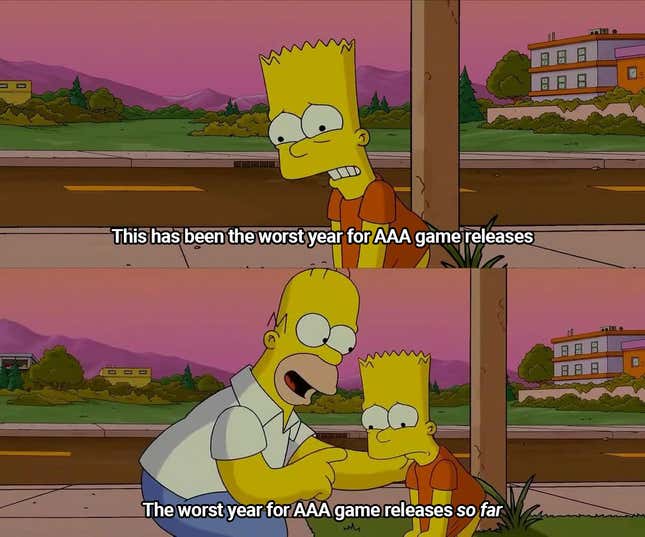In some ways it feels like more video games are coming out than ever before. Yet in another way, one that so many of the loudest and most expensive sides of the video game industry are built around, 2022 was a drought like no other.
If you want to talk about lil’ platformers on the Switch, or city-builders on Steam, or weird horror adventures on itch.io, then this was a bumper year. If you’re going by sheer volume there are more video games to play today, across more platforms, than ever before. As packed as the calendar was with smaller and even mid-tier games, though, a glance at the blockbuster release schedule in 2022 was dire reading.

What’s a “Big Game”?
I’m using the term as shorthand to describe a standalone, blockbuster video game release, one that’s usually funded by a major publisher and which has an inescapable level of hype/awareness. Think Call of Duty, Halo, God of War, Zelda, that kind of game. The big ones! You know what I’m talking about!
It’s easy to forget, as comfortable with its routines as we are, how much of this industry still revolves around that calendar, blissfully unaware (or unwilling to accept) that it’s not 2003 anymore. The timing and volume of AAA game releases has been the cornerstone of everything from major events like E3, to development schedules, to sales periods, to retail channels, right on down to when the writers of video game websites like this one used to be able to take a vacation (until recently it was never in October or November, that would be too busy!).
Over the last few years, what used to be a flood of high-profile releases slowed to a trickle, however, and by 2022 it was more like a slow drip. But the framework around those games, which has settled in like scaffolding that nobody knows how to or wants to take down, is still there. Huge parts of the video game industry have spent the year echoing around it, lonely footsteps booming through a cavernous, empty church. 2022 wasn’t a year notable for its big games. It was a year notable for their absence.
Sure, some came out. They always have and they always will. Elden Ring, God of War, Horizon, a revamped Call of Duty. But what else? As recently as four to five years ago the year would be full of big, expensive releases from major publishers. Especially now, during holiday seasons that were once jam-packed with the kinds of games that begged you to pre-order them with big posters at a GameStop, that would clog up an E3 press conference. In 2022 you could hear a pin drop for whole months at a time.
Why?
Most people’s first answer would probably be the pandemic. Its impact screwed up development schedules the world over. While some games were rushed out in the middle of it, others have been delayed months or even years to recover from the chaos of having to send whole studios home during the worst of it. Lots of games that should have come out by now haven’t, leading to one hell of a logjam in early 2023.
But I don’t think that’s the right answer. That logjam is temporary, and is obscuring wider trends that the pandemic only exasperated. The truth is, the AAA landscape has been shrinking for years. Everything has gotten too big, too expensive. The math is simple: games take longer to make, and need more developers to make them, so we are getting fewer of them.
And even then, not all those big releases are new. Publishers are so risk averse in the modern age that remakes are now big business, companies clearly preferring the safe money to be made in restoring a proven classic than trying something original. So yes, the year did also see major releases like The Last Of Us, a game that...came out in 2013 and had already been remastered once before.
Throw in an ongoing obsession with turning the few released games we do get into a live-service experiment, publishers hoping to sell content for them for years after release, and you can see not only how we ended up in this AAA drought, but why it’s going to only get worse (or at least weirder) in the years to come. Assassin’s Creed is leading the charge here; what used to be a flagship series that released every one to two years is about to become a platform unto itself. But it’s also visible everywhere from Call of Duty’s persistent Warzone to Fortnite’s seasons. Big games aren’t just not getting released anymore; the ones that are will never go away.
Yet for all this change, that scaffolding—the structures of hype and commercialisation erected to encase the AAA business model—remains. Even as the very thing they’re built around starts to collapse. Look at GameStop, previously a store that sold boxed video game releases, now an NFT clearing house and meme stock placeholder. Look at big trade shows like E3, whose bread and butter—major reveals and huge press conferences—have moved on and downsized. These vestiges of the old world remain, but the sand on which they’re built is starting to wash away.
I want to be clear and say that, unless you run E3 or work at GameStop, this is not a bad thing! Smaller games rule, mid-tier games rule, smaller studios and more agile publishers rule, phone games rule, and millions of people (and millions more each year) are very happy playing video games every day in ways that don’t involve spending $70 on a box that says “PlayStation 5 exclusive” on the front.
But for anyone involved in that creaky framework, or even emotionally invested in the idea of standalone AAA game releases—people still writing down E3 press conference times in their diary, I’m looking at you—these must be troubling times. Because while 2022 may look like a barren year for blockbuster video games:
